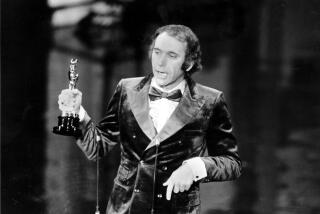FILM REVIEW : Warren Beatty Plays to Win With ‘Bugsy’
- Share via
LOS ANGELES — Imagine a man who is a law unto himself, for whom the ordinary rules of life don’t seem to apply. A charming egotist concerned with looking good who has a relentless eye for the ladies. Someone who considers himself both a visionary and a creator in a strictly money business. Is it Benjamin Siegel, gangster extraordinary, or Warren Beatty, the movie star’s movie star?
Or is it both of them?
It is part of the considerable appeal of “Bugsy” (throughout San Diego County), director Barry Levinson’s glossy new film, that to varying degrees those characteristics fit both the picture’s subject and its star. And a great deal of the fun of watching this very assured film is seeing with what energetic panache the actor takes on the mantle of the mobster J. Edgar Hoover once called “the most dangerous man in America.”
Like many stars who trade to varying degrees on their personalities, Beatty has in recent years had trouble finding characters he feels enough of a connection with to successfully play. But when, eight years ago, he happened upon the idea of doing a film on the 1940s L.A. mob boss, an unlikely dreamer who just about invented Las Vegas, he struck gold and he knew it.
Even more shrewdly, Beatty, who had become something of a one-man show of late, doing everything on his pictures but punching the sprocket holes in the film stock, eventually realized this was not a movie he could do all by himself. So in came screenwriter James Toback and, years later, director Levinson. Each of the trio brought a markedly different sensibility to the project, and the result of their collaboration, though not without its flaws, is overall a satisfying film that delivers a full measure of stylish entertainment.
While this year’s “Mobsters” covered the earlier stages of Siegel’s life, “Bugsy” (a nickname he apparently hated with a passion) picks him up in midlife with a house and family in ritzy Scarsdale and a mandate from his colleagues in the New York mob, Meyer Lansky (Ben Kingsley) and Charlie Luciano (the late Bill Graham): Take the Twentieth Century Limited out to Los Angeles, talk to the local gangland boss and see about muscling in on the action.
Screenwriter Toback, whose own career as a writer-director (“Fingers,” “The Pick-Up Artist”) has been a rather curious one, has not only expertly divided “Bugsy” into three parts, he has also brought his gift for dark and witty dialogue to each of them.
First off we meet Mr. Siegel and come to understand what kind of an ultimate loose cannon he is, as capable of cold-blooded murder as casual generosity. Then we watch his growing infatuation with good-time girl and B-picture bit-player Virginia Hill (Annette Bening, Beatty’s real-life flame) and his emergence (helped by a friendship with George Raft, played by Joe Mantegna) as a fixture on the Hollywood social scene. Finally, we see him coming up with the idea of Las Vegas, a gambling mecca in the middle of the desert, and watch him attempt to maneuver his dream into reality.
Toback has a special flair for laconic gangster talk, for turning glowering thugs into existential comedians, and “Bugsy” has the cast to make the most of his words. Kingsley, who never disappoints, is especially effective here as the grave, formal Lansky, as is Graham as the more tempestuous Luciano and Harvey Keitel as the pugnacious Mickey Cohen. More of a surprise is the fine performance of Elliott Gould, looking lonely, bulky and lost as Harry (Big Greenie) Greenberg, a Siegel confrere.
But dominating the film, as he should, is Beatty’s Bugsy. Though those who remember his ossified performance in the ill-starred “Dick Tracy” may have trouble believing it, the actor brings an enormous amount of brassy self-confidence to bear in this role, one that he clearly understands from the inside out.
Threatening to personally assassinate Mussolini one day, literally buying a man out of his house the next, Siegel has the innate fascination of a man who might do absolutely anything, and Beatty’s verve and elan in playing him obliterate the difficulties he has with a New York accent and provide the energy that keeps the film on track.
Apparently fearing genre overload from the audience, the makers of “Bugsy” have insisted in pre-release publicity that theirs is not really a gangster film, and it is here that director Levinson’s sensibility comes into its own. Not only did he help oversee (along with production designer Dennis Gassner and cinematographer Allen Daviau) the understated elegance of the film’s vintage ‘40s look, but his very human touch has added numerous small moments to the film that make it more real and more affecting.
More than that, from “Diner” all the way through “Avalon,” Levinson has always been a director who completely understands the concept of the American Dream, and his sensibility is perfect for this story of a man who cared so little about money that he was willing to stake everything he was or ever hoped to be on a crackpot scheme to turn a corner of Nevada desert into the pleasure dome of the American West.
Despite these strengths, “Bugsy” (rated R for violence, language and sensuality) does have an area of weakness and that, curiously enough given the realities of the situation, is the romance between the man and Virginia Hill. Although their courtship scenes are fine, and though Bening as always does excellent work, once the pair become an item, their relationship deteriorates into a series of shouting matches that get as tiresome on film as they no doubt were in real life.
This awkwardness at the film’s emotional center also affects those wearying moments when Siegel really went bughouse, throwing pathological fits and terrifying all those within earshot. Still, it doesn’t feel quite right to take out a contract on this film. When you’re faced with as much against-your-better-judgment charm as both Siegel the man and “Bugsy” the motion picture possess, it’s hard to turn away.
“BUGSY”
Warren Beatty: Bugsy Siegel
Annette Bening: Virginia Hill
Harvey Keitel: Mickey Cohen
Ben Kingsley: Meyer Lansky
Joe Mantegna: George Raft
Elliott Gould: Harry Greenberg
Bill Graham: Charlie Luciano
A Mulholland Productions/Baltimore Pictures production, released by Tristar Pictures. Director Warren Beatty. Producers Mark Johnson, Barry Levinson, Warren Beatty. Screenplay James Toback. Cinematographer Allen Daviau. Editor Stu Linder. Costumes Alberty Wolsky. Music Ennio Morricone. Production design Dennis Gassner. Running time: 2 hours, 15 minutes.
MPAA-rated R (violence, language, sensuality).
More to Read
Only good movies
Get the Indie Focus newsletter, Mark Olsen's weekly guide to the world of cinema.
You may occasionally receive promotional content from the Los Angeles Times.











